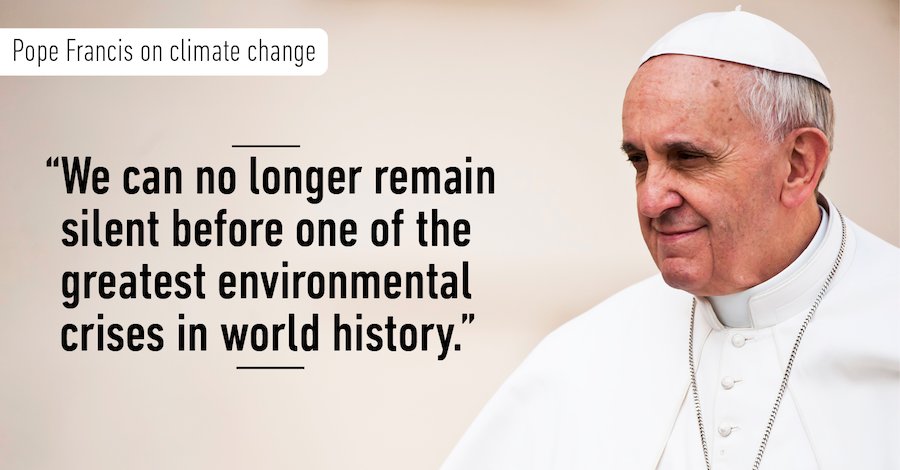"We must move beyond the mentality of appearing to be concerned but not having the courage needed to produce substantial changes"
OLIVIA ROSANE for Common Dreams
In his second major address on the climate crisis, Pope Francis called for urgent global action ahead of the COP28 United Nations climate conference.
The pontiff's remarks came in a papal exhortation published Wednesday morning titled "Laudate
Deum" or "praise God."
"We must move beyond the mentality of appearing to
be concerned but not having the courage needed to produce substantial
changes," Francis said.
The pope made waves in 2015 when he published an encyclical on climate and the environment
titled Laudato Si, shortly before world leaders negotiated the Paris agreement.
An exhortation is a shorter, less prestigious document, according
to The Washington Post. In Wednesday's document, the first he
has published on the climate crisis in eight years, Francis reflected on how
far the world hadn't come.
"With the passage of time, I have realized that our
responses have not been adequate, while the world in which we live is
collapsing and may be nearing the breaking point," he said.
As the world prepares for COP28, he said that international agreements had not so far led to effective action.
"The necessary transition towards clean energy sources such as wind and solar energy, and the abandonment of fossil fuels, is not progressing at the necessary speed," he said. "Consequently, whatever is being done risks being seen only as a ploy to distract attention."
He also addressed concerns about the conference being
hosted in a major oil-producing country, though he acknowledged that the United
Arab Emirates had made significant investments in renewable energy.
"Meanwhile, gas and oil companies are planning new
projects there, with the aim of further increasing their production," he
said.
The pope warned about the consequences of inaction:
We know that at this pace in just a few years we will surpass the maximum recommended limit of 1.5° C and shortly thereafter even reach 3° C, with a high risk of arriving at a critical point.
Even if we do not
reach this point of no return, it is certain that the consequences would be
disastrous and precipitous measures would have to be taken, at enormous cost
and with grave and intolerable economic and social effects. Although the
measures that we can take now are costly, the cost will be all the more
burdensome the longer we wait.
Yet he also counseled against abandoning hope, saying it
"would be suicidal, for it would mean exposing all humanity, especially
the poorest, to the worst impacts of climate change."
Instead, he argued that hope should be found in
structural changes rather than relying entirely on technological fixes like
carbon capture.
"We risk remaining trapped in the mindset of pasting
and papering over cracks, while beneath the surface there is a continuing
deterioration to which we continue to contribute," he wrote. "To
suppose that all problems in the future will be able to be solved by new
technical interventions is a form of homicidal pragmatism, like pushing a
snowball down a hill."
Throughout the text, he emphasized climate justice,
pointing out that the wealthy world had contributed more to the crisis, while
the Global South suffered disproportionately from its impacts. In particular,
he called on the United States to alter its energy-intensive lifestyle.
"If we consider that emissions per individual in the United States are about two times greater than those of individuals living in China, and about seven times greater than the average of the poorest countries, we can state that a broad change in the irresponsible lifestyle connected with the Western model would have a significant long-term impact," he said.
He also defended climate activists who have been
criticized for disruptive tactics.
"In conferences on the climate, the actions of
groups negatively portrayed as 'radicalized' tend to attract attention,"
he said. "But in reality they are filling a space left empty by society as
a whole, which ought to exercise a healthy 'pressure,' since every family ought
to realize that the future of their children is at stake."
Several long-time climate advocates welcomed Pope
Francis' remarks.
"The pope's intervention ahead of the Dubai climate talks is welcome and adds to an increasingly loud chorus of voices demanding that countries tackle the root cause of the climate crisis: fossil fuels," Mariam Kemple Hardy, global campaigns manager at Oil Change International, said in a statement.
"The pope is right to point
out the growing gap between the urgent need to phase out all fossil fuels and
the fact that countries and the oil and gas industry are doubling down on new
production that is incompatible with a livable climate."
Hardy also echoed the pope's emphasis climate justice,
calling out wealthy nations for continuing to exploit fossil fuels.
"Global leaders meeting in Dubai for COP28 must heed
the pope's call to agree to a just and equitable phaseout of all fossil fuels
and a transition to renewable energy, with adequate financial support for
impacted countries. Unless it does so, COP28 will be a failure," Hardy
said.
350.org and
Third Act co-founder Bill McKibben hoped
that the pope's message might succeed where others had failed.
"The work of spiritual leaders around the world may be our best chance of getting hold of things," McKibben told The Guardian. "Yes, the engineers have done their job. Yes, the scientists have done their job. But it's high time for the human heart to do its job. That's what we need this leadership for."
